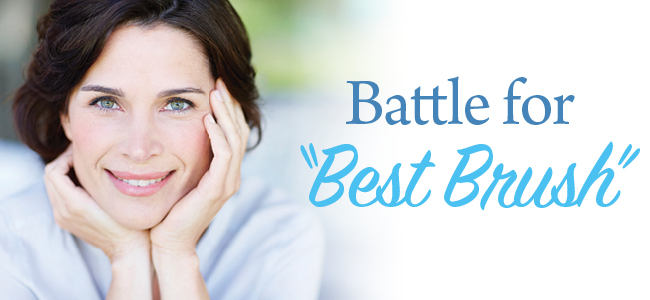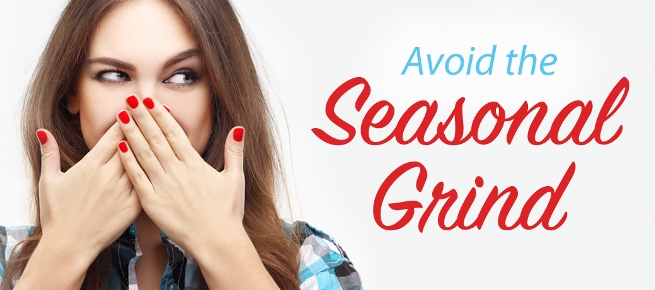
Once every three or four months, you inevitably find yourself standing in the oral hygiene aisle at the grocery store scanning rows and rows of an endless variety of toothbrushes. They come in all shapes, sizes, and colors — and some of them even come with small motors. But how do you know which one is the best for you or your children?
The Basics
There are some basics you should look for when purchasing a new brush:
- The handle of the toothbrush should be a length and shape that best allows you to hold and maneuver it as you brush.
- The head of the toothbrush should be able to easily access all of the surfaces of your teeth. A half inch wide and one inch tall works best for most adults.
- Toothbrushes come with bristles that are categorized as hard, medium, and soft. Soft is preferable for most people; medium- and hard-bristled brushes can cause damage to tooth enamel.
- Choose a brush with American Dental Association-approved nylon bristles.
Manual or Electric
Electric toothbrushes have become increasingly popular over the last several years. They come in all shapes and sizes, and they are suited for both children and adults. But are they more effective than manually brushing your teeth with a traditional brush? The American Dental Association (ADA) has addressed this topic in multiple news releases, saying that manual brushes can indeed be as effective as electric. People using manual brushes who have excellent oral hygiene practices can prevent tooth decay as well as those who use electric.
Electric toothbrushes can be very helpful for people who have difficulty adequately brushing. Individuals who suffer from a disability or arthritis, as well as children just learning to brush, stand to benefit from using a suitable electric brush.
Manual vs. Electric
Both manual and electric toothbrushes have their benefits and their drawbacks. This is how they stack up next to each other.
Benefits of the Manual Toothbrush
- Teeth can be adequately cleaned after only two minutes of brushing.
- Toothbrushes come in a large variety of sizes, shapes, and colors, so you can find the one that works perfectly for you and each of your family members, including your children. Some children’s brushes come with their favorite characters on them, making them extra appealing and fun to brush with.
- Low maintenance and travel friendly, manual toothbrushes don’t require batteries or electricity for recharging, and you can just pop them in your travel pack or purse when you are on the go.
- Manual toothbrushes are low cost or free (with some dental visits).
Benefits of the Electric Toothbrush
- There’s little work with a lot of payoff. With very little effort, these toothbrushes thoroughly clean your teeth.
- Many electric toothbrushes come with a timer so you don’t even have to pay attention to the clock — perfect for those groggy mornings.
- hese brushes are child friendly and tend to alleviate the battle parents typically face when trying to get their children to brush their teeth. Oftentimes children even look forward to the task. These brushes also come with fun characters printed on them.
Disadvantages of the Manual Toothbrush
- Using a manual toothbrush requires more effort and attention than when using an electric toothbrush.
Disadvantages of the Electric Toothbrush
- These brushes are more expensive than the manual alternative.
- Electric brushes are higher maintenance as they require batteries and the ability to recharge, which also makes them more challenging to travel with.
There are some basics that should be covered by any good brush. Whether you should choose to purchase a manual toothbrush or an electric toothbrush for your oral hygiene routine largely depends on your personal and lifestyle choices. While choosing the right toothbrush for yourself and your children is important, dedication your daily at-home oral hygiene routine and making it to your routine dental visits is crucial to maintaining your oral health.
If you would like to learn more about products and oral hygiene habits that will help you maintain your best oral health, call us today at (661) 952-7865 to set up an appointment.
More
By admin
15 Dec, 2015
Dental Health, Dental Tips, General Dentistry, General Health, Lifestyle
bad breath, dental health, dental hygiene, fresh breath, holiday dental tips, oral health, oral hygiene

Mistletoe has been hung, setting blissful, kissing booby traps for the unsuspecting, and when the ball drops, lips will lock everywhere.
During the month of December, your oral health and hygiene needs to be on point!
Brushing and rinsing twice a day, as well as daily flossing, helps keep your mouth healthy but doesn’t necessarily ensure fresh breath that will last all day long. And during a season hallmarked by the unexpected, one does not want to be caught face-to-face suffering from a bad case of halitosis. So what can you do to improve your chances of being 100% smoochable should the opportunity arise? Read on for breath-saving tips that are sure to improve your chances of ringing in the New Year with more than a smile on your lips.
Food for Thought
When you eat, food is absorbed into your bloodstream and expelled out of your lungs when you breathe. This means that you may suffer from bad breath even when your diet is healthy and balanced. The following foods are notorious for turning breath foul, so ingest them sparingly or at least with extreme caution.
- Garlic: This powerful herb can turn a bland dish into a delectable culinary work of art. Its versatility allows it to be used in a variety of cuisines and eaten or used for cooking whole, crushed, chopped, or dried and powdered. Garlic is also renowned for its health benefits and its ability to ward off vampires. While it does all of these amazing things, its major drawback is its ability to turn the odor of your breath into a scent so repellant that even the most determined admirer would have great difficulty overcoming their repulsion long enough to plant a wet one on you. Also note: If eaten regularly and in large quantities, it can affect your body odor negatively as well.
- Onion: While onion is not as powerful as garlic, its fellow odoriferous bulb, this herb is commonly used to enhance the flavor of a large range of dishes. It is often served raw in salads, added to soups and other savory dishes, and comes in a large variety of types and flavors. The types of onion include brown onions, green onions, leeks, pearl onions, shallots, and more, and while they are all very different in appearance, texture, and flavor, they all have one thing in common: They make your breath stink.
- Coffee: Too much coffee gives you bad breath. It’s a hard truth to face, especially since dates at coffee shops are where many love stories begin. Coffee is wonderful at delivering a warm wake-up call each morning and nurturing its consumer into a state of alertness that allows them to take on the day. While this is a deeply appreciated trait, what few people realize is that it’s also one of the most dehydrating drinks you can consume. We aren’t suggesting that you quit coffee for good, but if you want the confidence that comes with fresh breath, you should limit your consumption to a cup a day.
- Alcohol: Don’t give up your Champagne toast at midnight on New Year’s Eve, but do watch your overall consumption of alcoholic beverages. That beer you look forward to at the end of each day and that weekly happy-hour cocktail you consume with your co-workers is drying out your mouth. When your saliva flow runs low, bad-smelling bacteria sticks around and turns breath bad.
Battle Bad Breath
There are a variety of simple ways you can actively ward off and battle bad breath on a daily basis.
- Stay hydrated: Drink water all day long. It washes away leftover food particles and the bacteria that can lead to decay, and it helps you avoid dry mouth. Aim for six to eight 8-ounce glasses of water a day.
- Clean your tongue: Residual buildup between your taste buds and the fold in your tongue can affect your breath negatively. Keep your tongue clean by brushing it regularly. You can also find very effective tongue scrapers at most drugstores.
- Chew gum: Sugarless gum with xylitol keeps your breath fresh while cleaning your teeth. Gum stimulates the flow of saliva, which washes unwanted debris from your teeth.
- Snack on this: Crisp, fresh fruits and vegetables turn on the flow of saliva and decrease the occurrence of bad breath caused by hunger. When you become hungry, especially when you are on calorie-restricted diets, the acids in your stomach build up and give your breath a nasty scent.
- Eat your garnish: Parsley is a popular garnish on many of the dishes served in restaurants. Most people think the only purpose it serves is to pretty up your plate. But parsley contains chlorophyll, which is a powerful breath and post-meal romance saver.
If you want to feel completely confident this holiday season, give your Lancaster dentist Dr. Douglas Weber a call at (661) 952-7865 and set up a cleaning. We will make sure your smile is New Year’s Eve ready, so you can enjoy kissing this year goodbye.
More
By admin
30 Nov, 2015
Dental Discomfort, Dental Tips, General Dentistry, Lifestyle, Preventive Dental Care
bruxism, clenching teeth, face pain, grinding teeth, grinding teeth due to stress, headache, jaw pain, mouth guards, tmj causes

Protect Your Teeth From Holiday Stress: Avoid the Seasonal Grind
The holiday season is a time of year that comes with many things: visits from loved ones, weekly parties, a multitude of shopping trips, long hours spent in the kitchen, and stress-induced bruxism. Stress isn’t always a bad thing; in fact it can even be good in small doses. It can spur excitement, joy, and eager anticipation, and it can even function as that extra bit of motivation that you need to get everything on your to-do list done. Even when the outcome of the stress you are experiencing is positive, the effects it has on you physically can be negative.
What Is Bruxism?
The gradual onset of mild to moderate head and neck aches, jaw pain, and sensitive teeth can signal that stress is beginning to take a toll and that you might be suffering from a condition called bruxism. Bruxism is a condition in which you clench and grind your teeth throughout the day and night. The clenching and grinding can become so hard and loud that it can be heard by partners and loved ones within the affected individual’s living space.
Some individuals only suffer from short bouts of bruxism. But if you begin to experience any of the following associated symptoms with regularity, you should call and set up an appointment with our provider immediately.
Signs and symptoms that indicate you could be suffering from bruxism include:
- Worn tooth enamel
- Face pain rooted at the jawline
- Earache-like pain
- Headache in the temple area
- Sores from chewing or biting the inside of your cheek
- Grinding teeth during sleeping hours
If left untreated, bruxism can lead to more serious conditions that may require extensive and expensive care to resolve. These conditions include:
Damaged teeth: Individuals who suffer from bruxism end up clenching and unclenching their teeth all throughout the night. The pressure they put on their jaws can equate to 250 pounds or more worth of force, which can cause extreme wear and tear on teeth. Tooth sensitivity is the least of the repercussions this type of pressure can have on oral health. Chipped, cracked, and severely worn teeth can result, requiring extensive restorative treatments.
TMJ: TMJ is disorder of the temporomandibular joints that causes pain in the jaw, head, and neck areas. It can cause the jaw muscles to spasm and make it difficult for sufferers to open and close their mouths normally. Treatments may include Botox injections, medications that relax muscles, and protective nighttime mouth guards.
Sleep disturbances: Bruxism ranks as the third most frequent abnormal sleep behavior. Some suffers become aware of their condition after seeking out help for severe sleep deprivation and exhaustion. They have no idea that they have been grinding their teeth at night, nor that it is the cause of their daytime drowsiness.
Who’s at Risk?
Risk factors that increase your likelihood of suffering from bruxism include:
- Age: Bruxism is most common in children but can extend into adulthood.
- Stress level: If you have a high level of stress or an increase in anxiety, you may begin to experience the signs of bruxism.
- Substance intake: Smoking tobacco, drinking caffeinated and alcoholic beverages, or taking medications that have stimulants in them may increase the risk of bruxism.
Diagnosing Bruxism
If your dentist suspects that you have bruxism, he or she will perform an exam and evaluate you for the following:
- Damage to your teeth, the bone that supports them, and the soft tissues inside your mouth
- Pain and tenderness in the jaw and mouth area
- Common dental abnormalities that are often indicators, like broken, worn-down, or missing teeth and poor tooth alignment
If you have signs of bruxism, our dentist may choose to look for changes that may have taken place over the course of your visits. Your exam may include x-rays and questionnaires.
Treatments
In the case of children affected by bruxism, treatment is rare. The majority of children age out of bruxism. Adults who grind their teeth enough to cause damage and inflict pain have treatment options that include dental protection devices, such as mouth guards and splints, and corrective dental treatment plans designed to align teeth properly. Realigning teeth may require braces and, in severe cases, oral surgery.
If stress is at the root of a patient’s bruxism condition, our dentist will refer them to a therapist that specializes in stress management and behavior therapy. In some cases, medications such as muscle relaxants may also be prescribed.
The holiday season is a time of year to be enjoyed. You don’t have to let the excitement and anticipation take an unpleasant toll. If you are experiencing any of the symptoms that may indicate you are suffering from bruxism, call Dr. Douglas Weber at (661) 952-7865 to schedule an appointment today.
More
By admin
22 Nov, 2015
Dental Tips, General Dentistry, Lifestyle, Preventive Dental Care
dental health, healthy fall foods, healthy pumpkin prepration, healthy recipe, holiday dental tips, oral health, oral health benefits of pumpkin

Dentists Say, “Back Away From the Spiced Latte! But the Pumpkin Can Stay.”
It probably comes as no surprise that the Pumpkin Spice Latte is Starbucks’ most popular seasonal drink of all time. Everything about the pumpkin’s color, aroma, and savory flavor screams fall. Every year coffee enthusiasts eagerly await the release of this highly anticipated beverage, then flock to the coffee shop as soon as it becomes available. At least that is how it has gone for the better part of the last 12 years, since its inception in 2003.
But the Pumpkin Spice Latte isn’t your average cup o’ joe. Recently, the beloved libation has come under fire for the large amount of calories (380) and sugar (50g) it contains. Health and fitness professionals are urging people to consume it like they would any other dessert: in moderation. And while most health professionals are worried about the damage the Pumpkin Spice Latte can do to people’s waistlines, dentists are more concerned with the impact it could have on their patients’ teeth.
The bad news is that any way you look at it, the amount of sugar in your beloved Pumpkin Spice Latte, along with the length of time you spend sipping it down, is a recipe for tooth decay. The good news is that you can still satisfy your autumnal craving for pumpkin goodness by preparing and consuming it in different, delicious, healthier ways — and actually improve your dental and overall health while doing it.
Health benefits related to consuming pumpkin are plentiful. This vitamin-packed fruit can please both your nutrition/fitness professional and your dentist by protecting your teeth and whole health. Pumpkin provides:
- Zinc: Zinc is your mouth’s best friend. It plays a key role in healing wounds, which does wonders for damaged soft tissues inside your mouth, or gums that are healing from gingivitis-induced bleeding. Zinc is also considered an anti-plaque agent and is added to toothpaste to prevent buildup.
- Vitamin A: Vitamin A aids in the flow of saliva, which is key for washing bacteria from the mouth. It also plays a key role in healing soft tissues.
- Vitamin C: Vitamin C is key for maintaining a healthy immune system and fighting off infections. It’s good for your mouth and your overall health.
- Magnesium: Magnesium and calcium work together to create strong, protective enamel that can resist decay. Without the proper amount of Magnesium in your diet, your enamel becomes soft and susceptible to cavities.
- Fiber: Pumpkins are packed with fiber, which is important for maintaining excellent overall health. Fiber helps with weight control, and fiber-rich foods help stimulate the flow of saliva (your best natural defense against tooth decay).
If you are looking for a way to get your pumpkin fix this season while keeping your teeth and physique fit, minimize or eliminate the sugar. Consider replacing your daily spiced latte with these healthy pumpkin preparations:
Pumpkin seeds: From the store or straight from the gourd, these baked snacks are packed with flavor and good-for-your-teeth vitamins. They are easy to prepare and pack for lunch or an in-between-meal snack.
Pumpkin smoothie: Incorporate canned pumpkin into your breakfast or workout smoothie. It pairs well with coconut milk and almond butter. Throw in some pumpkin spice and maple syrup and your morning meal will be transformed into a healthy liquid version of the traditional pumpkin pie.
Baked pumpkin: You can make a tasty meal out of pumpkin by simply baking it with cinnamon and adding a little bit of butter. Pumpkin works as the main course but is also perfect as a side dish.
Pumpkin seed oil: One easy way to enjoy the health benefits that pumpkin has to offer is by incorporating pumpkin seed oil into your cooking. It adds a nutty seasonal taste to whatever dish you are preparing and is perfect for keeping you in that seasonal holiday mood.
Being dedicated to your physical and dental health doesn’t mean swearing off the Pumpkin Spice Latte for good. It just means taming your daily addiction and satisfying your pumpkin craving with snacks and dishes that are low in sugar and high in vitamin-rich goodness.
Call our Lancaster, CA dental office today at (661) 952-7865 and check up on your oral health. This is the perfect time to talk to Dr. Douglas B. Weber to find out more about how you protect your oral health through the holiday season.
More
By admin
11 Nov, 2015
Dental Discomfort, Dental Tips, General Dentistry, Lifestyle, Preventive Dental Care
brushing, enamel, fluoride, gum disease, sensitive teeth, teeth grinding, teeth whitening, tooth decay, tooth sensitivity

A breath of crisp winter air, a sip of hot cocoa, a bite out of a sweet candy cane — all of these have two things in common: They remind us of the rapidly approaching holiday season, and though less pleasant, each can also trigger the sharp, unexpected pain associated with tooth sensitivity.
What Is Tooth Sensitivity?
Tooth sensitivity is experienced as a sharp, sudden pain that is felt in the tooth and gum areas. It occurs when gum and enamel loss expose the sensitive surface of the teeth that lie beneath, called dentin. Dentin is less dense than enamel and contains thousands of tubes that lead to the tooth’s nerve center, called the pulp. Once the protective cover is lost, heat, cold, and sweet and acidic foods can reach the nerves inside the tooth through the tubes, eliciting a pain response. Fortunately, once the cause of tooth sensitivity is identified, there are options for treating it and restoring optimal oral comfort.
Causes of Tooth Sensitivity
Some of the things that lead to tooth sensitivity include:
- Overbrushing, brushing too hard, or brushing with a hard-bristle toothbrush
- Grinding and clenching teeth
- Tooth decay located near the gumline
- Plaque buildup
- Tooth-whitening products
- Gum disease
- Fractured tooth
- Dental work
Preventing Tooth Sensitivity
The key to preventing tooth sensitivity is maintaining good oral-hygiene practices. Brushing twice a day, flossing once a day, and rinsing regularly will go a long way toward keeping your gums and teeth healthy and strong. The following are additional steps you can take for reducing tooth sensitivity:
- Always use a soft-bristled toothbrush and brush gently
- Avoid foods and beverages that are acidic
- If you grind your teeth, talk to your dentist about getting a mouth guard to wear when you sleep
- Brush with toothpaste for sensitive teeth
- Keep your enamel strong by using products with fluoride
Treating Tooth Sensitivity
The manner in which tooth sensitivity is treated largely depends on the condition that led to it or the situation that is causing it. If sensitivity is resulting from a cavity or a chip in a tooth, a restoration can be placed to fix it. However, if sensitivity results from exposed dentin, there are treatments designed to reduce the discomfort.
- Fluoride varnish can be applied to the vulnerable, exposed areas of your teeth.
- A mouth tray with a high concentration of fluoride in the form of foam can be placed in your mouth for five minutes. This treatment strengthens weak areas.
- The bonding agent used to adhere restorations to teeth can be used to put a protective seal over the surface of the dentin.
- Gum tissue can be moved from one area of the mouth to an area where tissue has been lost from the root with a gum graft.
If you think you might be suffering from gum sensitivity, call us today at (661) 952-7865 to set up an appointment and find out more about what you can do to restore your oral comfort before the holidays hit.
More





